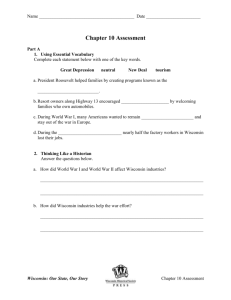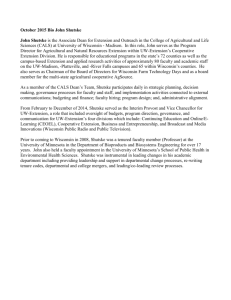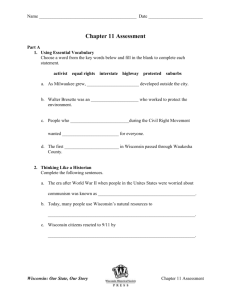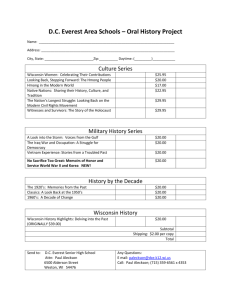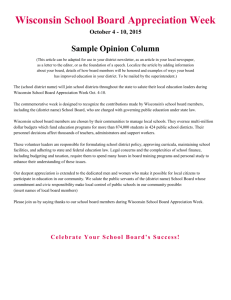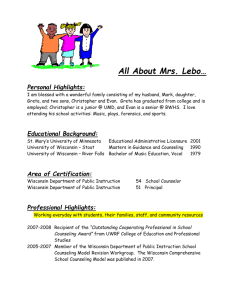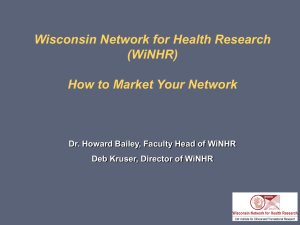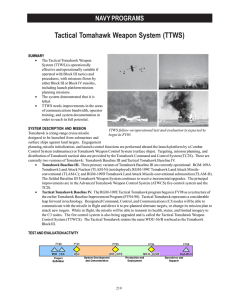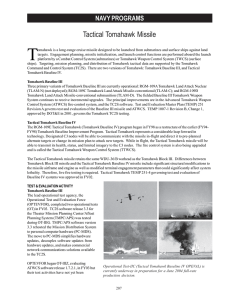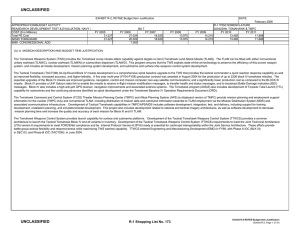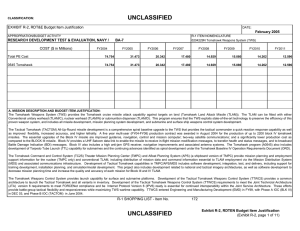UW-Extension & Tomahawk Main Street
advertisement
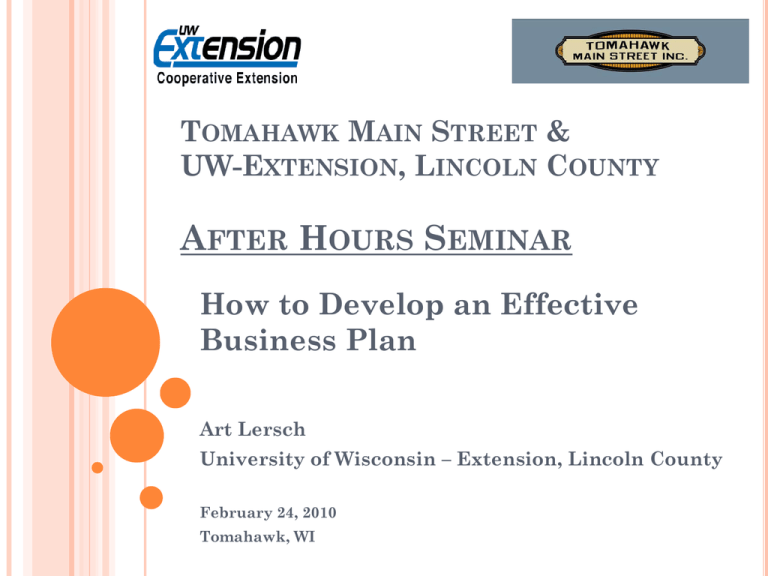
TOMAHAWK MAIN STREET & UW-EXTENSION, LINCOLN COUNTY AFTER HOURS SEMINAR How to Develop an Effective Business Plan Art Lersch University of Wisconsin – Extension, Lincoln County February 24, 2010 Tomahawk, WI LEARNING OBJECTIVES Business plan outline What your focus should be in each section. How to thrive? (What does the market want?) Defining uniqueness/niche. FIRST, THE RULES Focus on the business, not the dollars. Don’t try to do all of it yourself! Don’t try to do too many things at once. Don’t over think things, but do the homework. BREAK THE RULES, END UP LIKE THIS WHAT IS A BUSINESS PLAN? Business goals, milestones and priorities. Can I do this? Am I at the right stage of my life to do this? What can I sell? (Should that change?) What do I want to sell? (Should that change?) More importantly, what does the market need! WHAT IS A BUSINESS PLAN? (CONTINUED) Flexible Plan document for the entire life of the business Required if you are seeking a loan/other financing. Helps track! keep you focused, on the right ELEMENTS OF A GOOD BUSINESS PLAN Uniqueness Target market Location Competition ELEMENTS OF A GOOD BUSINESS PLAN Organization/structure Marketing Cost, price & cash flow BUSINESS PLAN OUTLINE Cover Page Table of Contents Section I. Executive Summary Section II. Business Description/Goals & Objectives Section III. Background Information Section IV. Organizational Matters Section V. Market Description/Assessment Section VI. Marketing Plan Section VII. The Financial Plan Appendix Section EXECUTIVE SUMMARY Highlights Written last One page Arouse curiosity “Introduce your unique business to the world!” What is in a question? EXECUTIVE SUMMARY Where is the business located? What is its structure? What product or service is being sold? What makes the business unique? (Why come to you rather than the person down the street?) What is the primary target market? What are the capital requirements and sources of funding? What will the funds be used for? EXECUTIVE SUMMARY Merely a brief summary. Make it tight. Entice the reader. EXECUTIVE SUMMARY = ELEVATOR SPEECH Make it as lofty as possible! INTERACTIVE EXERCISE Tell your table mates in less than a minute why they should come to your business rather than the competitor down the street or in the next town over. BUSINESS DESCRIPTION/GOALS & OBJECTIVES Describe the business in detail (expanding on what was said in the Executive Summary) History Goals of the business (if applicable) & Objectives (what, when, who) Mission (a succinct statement of purpose the business actually follows. Ask customers!) UNIVERSITY OF WISCONSIN-EXTENSION LINCOLN COUNTY Mission Statement “University of Wisconsin – Extension Lincoln County provides knowledge and resources to offer people opportunities for positive change where they live and work.” “An EEO/AA employer, University of Wisconsin Extension provides equal opportunities in employment and programming, including Title IX and American with Disabilities (ADA) requirements. Please make requests for reasonable accommodations to ensure equal access to educational programs as early as possible preceding the scheduled program, service or activity.” BACKGROUND INFORMATION Analyze the industry (current) Analyze the industry (future) The business “fit” in the industry Focus the story on the local situation, but also add current and projected regional and/or national trends! BACKGROUND INFORMATION Trade shows Trade publications Semi-local competition Company financial reports/summaries Internet research NAICS (North American Industry Classification System) BACKGROUND INFORMATION Are there enough local suppliers? If so, who are they? What similar services/products are out there in the industry? How difficult will it be to start a business in this industry (barriers and support system)? What changes are currently taking place in the industry? What changes may take place in the industry? How might your business be affected by changes in the local economy and or global economy? How will your business be affected by changes in the industry? INTERACTIVE EXERCISE What are the current trends, both favorable and unfavorable, in the industry under which your business is classified? ORGANIZATIONAL MATTERS Legal structure Management and their qualifications Employees Professional services and advice Volunteers (family or otherwise) Operating controls ORGANIZATIONAL MATTERS What is the business’ legal structure? What are the advantages and drawbacks of the legal structure? Who is doing what in the business? What are the managers’/owners qualifications (experience and education)? How many full and part-time employees will be needed (does the business have)? What functions do/will employees perform? What are manager/employee pay rates? What professionals does the business employ and what are their functions? What trainings and/or certifications will be needed by managers and employees? How will/do you foster business accountability (record – keeping, etc.)? MARKET ASSESSMENT Customer characteristics Competition Uniqueness Market share YOUR TARGET MARKET How do you know that the demand is really there? Determine what market you want to serve, and then provide something it wants! What does the market you are already serving want the most? WHERE IS YOUR TARGET MARKET? It looks great, but is anyone really there? TARGET MARKET RESEARCH (EXAMPLE/SUGGESTED METHOD) Market area (How close to the business do the majority of potential customers based on age live?) Population estimates (will market based on age grow?) Demographic characteristics (What are the projections?) Buying patterns. (What are their likes and dislikes?) Number and characteristics of competitors within the radius (Are they selling exactly what you are in the same way you are?) TARGET MARKET RESEARCH (EXAMPLE/SUGGESTED METHOD) Income levels (How many people in the radius that are the right age can afford to buy currently and in the future?) Traffic counts (in the location) Commuting patterns Questionnaires/informal conversations (What do they want or need that is not being supplied?) Educated guess of market share based on industry standards. Zip code tracking (or some other means). Are there other techniques, pieces of information that you have used? RURAL RESORT DWELLERS 56% of population is classified as rural resort dwellers using ACORN classification data. “Rural Resort Dwellers” are usually older. Their median age is 41.7 years but they are concentrated in the 45-plus age groups. More than four of ten are aged 45 years and older. Families are predominantly married couples, many recently retired to the area. This group has moderate income and are heavily oriented toward outdoor interests, spend on household improvements and home-centered activities. Source: Tomahawk Comprehensive Plan, 2006 RURAL RESORT DWELLERS – BUYING HABITS Rural Resort Dwellers live the great outdoors. Fourwheel drive vehicles, camping equipment and domestic trips reflect their lifestyle. Top-ranked for owning gardening equipment and like to garden, mail/phone order from magazines and catalogues, order videotapes/DVDs and needlework. Ranked among the highest to own large dogs, cats and taking vitamins. Spending – household furnishings and home improvements, small and large appliances, cameras, women’s apparel, jewelry and auto aftermarket products. Source: Tomahawk Comprehensive Plan, 2006; Business District Market Overview, UW Extension, 1999 Map courtesy of Bill Ryan, UW-Extension Center for Community & Economic Development INTERACTIVE EXERCISE Take a few minutes to describe to your table partners in as great detail as possible your business target market. MARKETING PLAN Advertising (cost/benefit) Packaging Pricing Distribution Forms of payment MARKETING PLAN How will you package the service/product? What price will you charge? How was the price determined? What form (s) of advertising will be the most effective and why? What is your advertising budget? How will the service or product be distributed? What forms of payment will you accept? FINANCIAL PLAN Budgets Statements Tax Returns FINANCIAL PLAN What is the current financial situation of the business? How much capital do you need to start or expand the business? How will the money be spent? How did you (or do you plan to) obtain the funding? What is your break-even point for various points in the business? What will be the terms of loans? THE ESSENTIALS Operating Profit Cash and advertising budgets and loss statement flow projections (three years) Income statement Balance sheet Personal budgets financial information including Who will take over? Do you want someone to take over? Will you continue to have a role? Will the business just close? (What if it is fulfilling a crucial community need?) APPENDIX SECTION Resumes Testimonials Photos Anything to help you persuade people that your business/business idea is viable. Anything that can show your and your employees’ dedication and experience. HOW DO I BEGIN? Target market (their needs) Define your business needs (resources) Financials (personal and business) FREE RESOURCES AVAILABLE Art Lersch, University of Wisconsin – Extension; 539-1075 Jack Sroka, Lincoln County Economic Development Corporation; 539-1024 UWSP Small Business Development Center (SBDC); 1-800487-7389 or 715-346-4704 Central Wisconsin SCORE; 715-384-3454 Wisconsin Entrepreneur’s Network (WEN); http://www.wenportal.org/ Wisconsin Business Wizard; http://ww2.wisconsin.gov/state/wizard/app/LoadIntro
